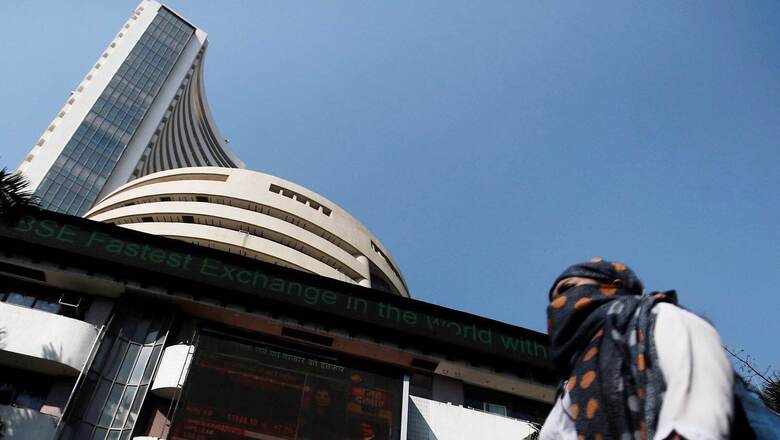
views
A day after Wall Street witnessed its worst one-day sell-off since June 2020, the domestic indices ended in a deep sea of red on the weekly F&O expiry session. The 30-share pack Sensex nosedived 1,416.30 points or 2.61 per cent at 52,792.23. Its broader peer NSE Nifty50 shed 430.90 points or 2.65 per cent to post its worst day since February 24, 2022, and close near the 15,809.40 mark.
Index heavyweights such as Infosys, Reliance Industries Ltd (RIL), Tata Consultancy Services (TCS), HDFC Bank, and ICICI Bank contributed the most to indices loss. ITC was the only stock in the Sensex pack to end with decent gains. The stocks ended 3.43 per cent higher after the company announced their March quarter results on Wednesday. All sectoral indices also finished the session with deep cuts.
The volatility index surged over 10 per cent to end near 2-month highs.
Also Read: Sensex Tanks 1,400 pts, Nifty Cracks Near 15,800; Why Indian Stock Market is Falling Today?
What Investors Should Do Now: Time to Rejig Portfolio?
Narendra Solanki, head of fundamental research- investment services, Anand Rathi, said: ?Rejigging of a portfolio should be part of the periodic exercise of any investor. Currently, long-term investors could continue to hold positions in existing companies as long as business prospects remain intact for the company as during weak markets even good stock also see some correction.?
Invest in Quality Mid-Cap and Large-Cap Stocks
Yash Gupta- equity research analyst, Angel One Ltd, said: ?Long-term investors should look at Rejig Portfolios towards large-and-mid-cap quality stocks. So from a longer-term perspective investors can look to invest 50 per cent of new capital in a diversified portfolio of large-and-mid-caps stocks or even they can look to invest via the Nifty and Nifty Midcap 100 ETF also. Short term investors need to be cautious and need to manage risk as we expect volatility to continue in markets.?
Mirroring similar thoughts, Manish Jain, fund manager, Ambit Asset Management, said: ?Yes, as long-term investors, we have observed that the impact is often exaggerated in our minds as compared to the eventual outcome. Great companies are best bought in the worst time. Valuations are reasonable, pricing is mismatched, and long-term growth potential remains intact. The way we look at things ? this is the best time to add good quality stocks to the portfolio from a long-term perspective.?
Be Patient, Stay Invested
Abhimanyu Kasliwal, Choice Equities said: ?Long term investors, presuming they have done research and entered their positions, should be patient. Fundamentally strong companies have seen a correction and may possibly see more correction- however, those with a long term horizon (3-5 years) with no immediate liquidity needs should remain invested if the company, its management and long term prospects remain good.?
Buy the Dip
Long-term investors can accumulate value stocks during this dip as all sectors are facing a sell-off. Manoj Dalmia, founder and director, Proficient Equities, said: ?Due to the weakening of rupee sectors relating to export will benefit such as IT, pharma, metals, etc.? Meanwhile, for short-term investors Dalmia said that the strategy could be to avoid a heavy position and buy at small amounts whenever the market dips, this will ensure in the long term it will add value.
Investors Should be More Concerned About Economic Volatility
?Portfolio reshuffling should be based on individual stocks risk reward rather than how the broader market is doing. As long as the premise for buying a stock remains intact a fall in its share price makes it more attractive for an investor. However, if there are other stocks that are available at a compelling valuation and offer a better reward to the risk taken, in such a case the investor can consider adding them,? Vijay Singhania, chairman, TradeSmart. More than the volatility in the market an investor should be concerned about the volatility in the economy, he added.
Read all the Latest Business News here



















Comments
0 comment